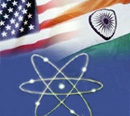
Despite India's statement on Friday which gave some positive momentum to the talks in Vienna being laid by NSG countries for granting waiver to India to bring it in the mainstream nuclear commerce, the talks met a setback at the end of the meeting. The picture is completely bleak yet. However, last ditch effort will be made out today to end the deadlock at the deliberations.
The marathon meet which concluded inconclusively on Friday will begin again on Saturday (Sep 06) to allay the apprehensions of sceptical countries raising doubts that deal might enhance the proliferation of nuclear technology and increase the arms race as the current draft of the deal does not restrict India to refrain from conducting nuclear test explosions.
Austria, the capital of Vienna where the NSG meeting is being conducted, is among the six smaller countries – New Zealand, Switzerland, the Netherlands, Ireland, Norway - opposing to the present form of deal. They are asking for tougher conditions—chiefly, moratorium on nuclear commerce if India goes for nuclear bomb test—to be written into the draft proposal granting waiver to India from the NSG rules.
US in its attempt to grant India “clean and unconditional” NSG waiver tried hard to remove doubts of the holdout NSG members by citing reference to India's commitment to non-proliferation, its past records and said it would be unfair to keep aloof the world's largest democratic country from the cartel of nuclear nations. Instead, the US said India's incorporation into the NSG would promote the international community's agenda with regard to non-proliferation.
Meanwhile, the statement issued by External Affairs Minister Pranab Mukherjee from New Delhi 'affirming its commitment to efforts of non-proliferation' acted to give positive momentum to the deliberations.
US has said that it is still hopeful to reaching consensus at NSG to allow nuclear trade with India.
"This is an important matter. This is a serious subject that is given a very serious discussion by our colleagues and I remain optimistic that we can achieve our objective to reach a consensus here," said John Rood, US Under Secretary for Arms Control and International Security.
The objections at the meeting which started by the six countries gradually reduced to two by the adjournment of the deliberations. Austria and Ireland, reports say, were the two remained unconvinced about the revised draft terming it as “inadequate.”
The two countries said the draft explicitly incorporate the clause defining what kind of “automatic reprisal” would be taken in the event of transgression.
Diplomats were working late to make final alterations to the draft, admissible to all. Two set of changes have already been done so far.
Ruling out any substantive changes, India has rejected any attempt to add a 'clause on testing' to the waiver document. However, External Affairs Minister Pranab Mukherjee on Friday asserted that India was committed to “non-proliferation” and a “unilateral moratorium” on nuclear testing.
|
|
Read More: Delhi


Comments: